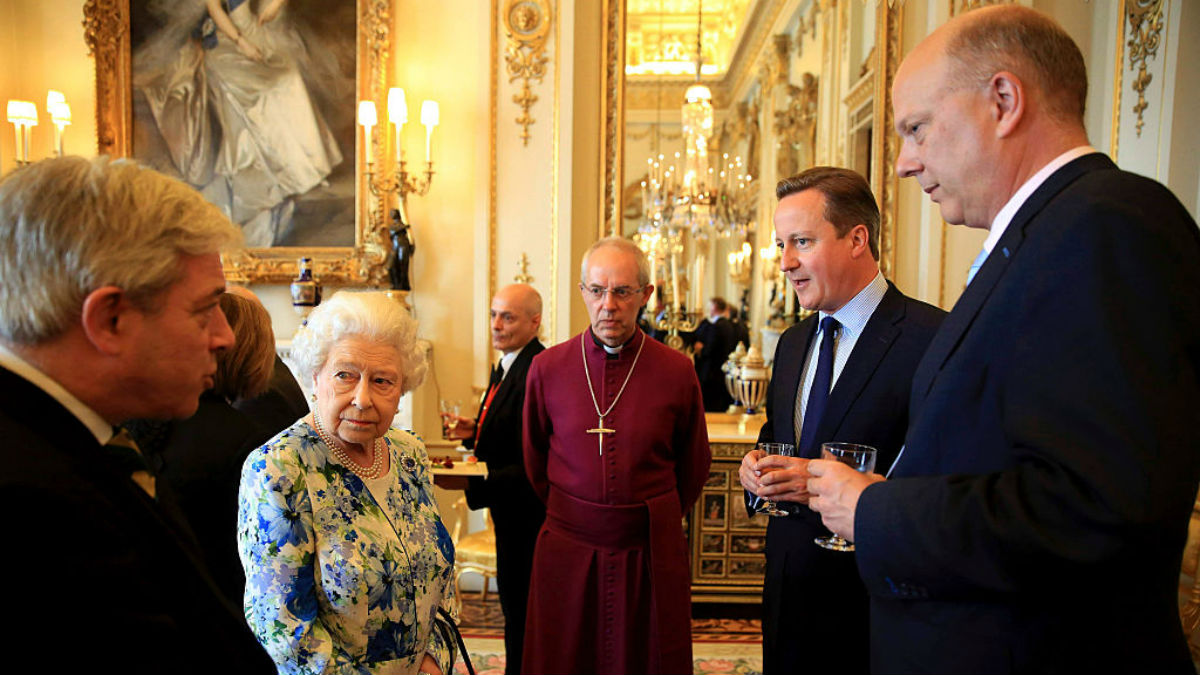PM's corruption gaffe: Which countries have the biggest problem?
David Cameron caught on camera describing Nigeria and Afghanistan as 'fantastically corrupt'

A free daily email with the biggest news stories of the day – and the best features from TheWeek.com
You are now subscribed
Your newsletter sign-up was successful
David Cameron has been left red-faced after he was caught on camera describing Nigeria and Afghanistan as "fantastically corrupt" ahead of a major anti-corruption conference in London.
The Prime Minister was talking to the Queen and the Archbishop of Canterbury Justin Welby during a reception at Buckingham Palace on Tuesday to mark the monarch's 90th birthday.
"We've got some leaders of some fantastically corrupt countries coming to Britain," he said. "Nigeria and Afghanistan, possibly the two most corrupt countries in the world."
The Week
Escape your echo chamber. Get the facts behind the news, plus analysis from multiple perspectives.

Sign up for The Week's Free Newsletters
From our morning news briefing to a weekly Good News Newsletter, get the best of The Week delivered directly to your inbox.
From our morning news briefing to a weekly Good News Newsletter, get the best of The Week delivered directly to your inbox.
Welby interrupted to defend Nigerian President Muhammadu Buhari, insisting he "is not corrupt" and "is trying very hard".
Buhari, who was elected last year on an anti-corruption platform, said he was "shocked" at the PM's comments, while a senior Afghan official said the characterisation was "unfair".
As if the momentary lapse of diplomacy was not "ample cause for chagrin", says The Independent, Buhari is scheduled to deliver a keynote address at Thursday's conference under the theme: "Why we must tackle corruption together".
It is likely to be an "awkward encounter" for Cameron following his "acutely embarrassing indiscretion", adds the newspaper.
A free daily email with the biggest news stories of the day – and the best features from TheWeek.com
According to research by global watchdog Transparency International, more than two-thirds of countries across the world have a serious problem with corruption within the public sector, with half of the G20 countries labelled as corrupt.
Afghanistan is ranked near the bottom of the least-corrupt rankings, at 166 out of 167 countries. Somalia, North Korea, Sudan, Angola and South Sudan are also in the lowest spots, while Nigeria is at 136.
Northern Europe tops the list, with the UK at number ten, tied with Germany and Luxembourg.
However, the report adds: "Just because a country has a clean public sector at home, doesn't mean it isn't linked to corruption elsewhere."
There is a hopeful note, however: more countries improved their corruption rankings than declined – Greece, Senegal and the UK among them. On the other hand, Australia is one of those to have seen a steady decline in recent years. Sitting at number 13, it dropped by six points, from 85 in 2012, to 79 in 2015.
Northern Europe tops the least-corrupt rankings, with the UK at number ten, tied with Germany and Luxembourg, but the report is cautious, stating that "just because a country has a clean public sector at home, doesn't mean it isn't linked to corruption elsewhere".
The ten most corrupt:
1. North Korea and Somalia (tied)
2. Afghanistan
3. Sudan
4. Angola and South Sudan (tied)
5. Iraq and Libya (tied)
6. Haiti, Guinea-Bissau and Venezuela (tied)
7. Eritrea, Syria, Turkmenistan and Yemen (tied)
8. Uzbekistan
9. Burundi, Cambodia and Zimbabwe (tied)
10. Chad, Democratic Republic of Congo, Myanmar (tied)
The ten least corrupt:
1. Denmark
2. Finland
3. Sweden
4. New Zealand
5. Netherlands
6. Norway
7. Switzerland
8. Singapore
9. Canada
10. Germany, Luxembourg and UK (tied)
-
 What to know before filing your own taxes for the first time
What to know before filing your own taxes for the first timethe explainer Tackle this financial milestone with confidence
-
 The biggest box office flops of the 21st century
The biggest box office flops of the 21st centuryin depth Unnecessary remakes and turgid, expensive CGI-fests highlight this list of these most notorious box-office losers
-
 The 10 most infamous abductions in modern history
The 10 most infamous abductions in modern historyin depth The taking of Savannah Guthrie’s mother, Nancy, is the latest in a long string of high-profile kidnappings
-
 Epstein files topple law CEO, roil UK government
Epstein files topple law CEO, roil UK governmentSpeed Read Peter Mandelson, Britain’s former ambassador to the US, is caught up in the scandal
-
 Iran and US prepare to meet after skirmishes
Iran and US prepare to meet after skirmishesSpeed Read The incident comes amid heightened tensions in the Middle East
-
 Israel retrieves final hostage’s body from Gaza
Israel retrieves final hostage’s body from GazaSpeed Read The 24-year-old police officer was killed during the initial Hamas attack
-
 China’s Xi targets top general in growing purge
China’s Xi targets top general in growing purgeSpeed Read Zhang Youxia is being investigated over ‘grave violations’ of the law
-
 Panama and Canada are negotiating over a crucial copper mine
Panama and Canada are negotiating over a crucial copper mineIn the Spotlight Panama is set to make a final decision on the mine this summer
-
 Why Greenland’s natural resources are nearly impossible to mine
Why Greenland’s natural resources are nearly impossible to mineThe Explainer The country’s natural landscape makes the task extremely difficult
-
 Iran cuts internet as protests escalate
Iran cuts internet as protests escalateSpeed Reada Government buildings across the country have been set on fire
-
 US nabs ‘shadow’ tanker claimed by Russia
US nabs ‘shadow’ tanker claimed by RussiaSpeed Read The ship was one of two vessels seized by the US military